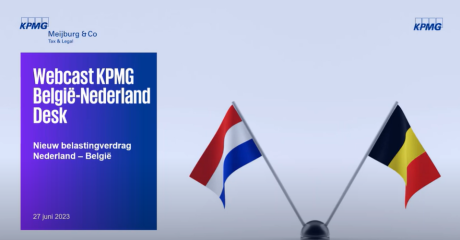Highlights
- The new treaty contains various measures that make it easier to do business and work across the border.
- An important improvement is that the new treaty provides for an exemption from dividend tax if a subsidiary in the one country distributes dividends to its parent in the other country, provided that the parent company holds a shareholding of at least 10% in the subsidiary during a period of at least 365 days. The old treaty only provided for a reduction in the dividend tax rate to 5%.
- The Netherlands no longer has the power to levy, in certain circumstances, a 10% tax on interest paid by a debtor in the Netherlands to a creditor in Belgium
- With regard to directors under the articles of association, the activities they perform will from now on be split into activities performed as a director under the articles of association and other activities. This may mean that directors will in future have to pay tax in two countries, rather than only in the country where the company is established.
- Contrary to what retirees had hoped for, no changes have been made to the complex pension article in the treaty.
- Professors, lecturers, athletes and artists no longer fall under a special regime; from now on they will be taxed as ‘ordinary’ employees and entrepreneurs.
- Belgium does not have to credit the Dutch dividend tax (15%) that is levied on dividends paid from the Netherlands to a natural person who is a resident of Belgium. The tax burden on Dutch business profits distributed to a shareholder in Belgium is therefore the sum of 25.8% Dutch corporate income tax plus 15% Dutch dividend tax plus 30% Belgian personal income tax increased by the Belgian municipal surtax (a total burden of about 57%).
The treaty contains several anti-abuse provisions that mean that a company established in the one country will have to pay profit tax in the other country where it is active much sooner than is now the case. There is also a general anti-abuse provision that allows treaty benefits to be refused if an arrangement or transaction is aimed at avoiding tax.
KPMG Belgium-Netherlands Desk
The KPMG Belgium-Netherlands Desk is part of the tax and legal practice of KPMG Meijburg & Co in the Netherlands. Its main aim is to advise and assist Dutch clients that are subject to tax in Belgium and clients living or based in Belgium that are subject to tax in the Netherlands.
KPMG België-Nederland Desk
The KPMG België-Nederland Desk is part of the tax and legal practice of KPMG Meijburg & Co in the Netherlands. Its primary objective is to advise and assist Dutch clients with tax obligations in Belgium, as well as clients residing and established in Belgium with tax obligations in the Netherlands.



